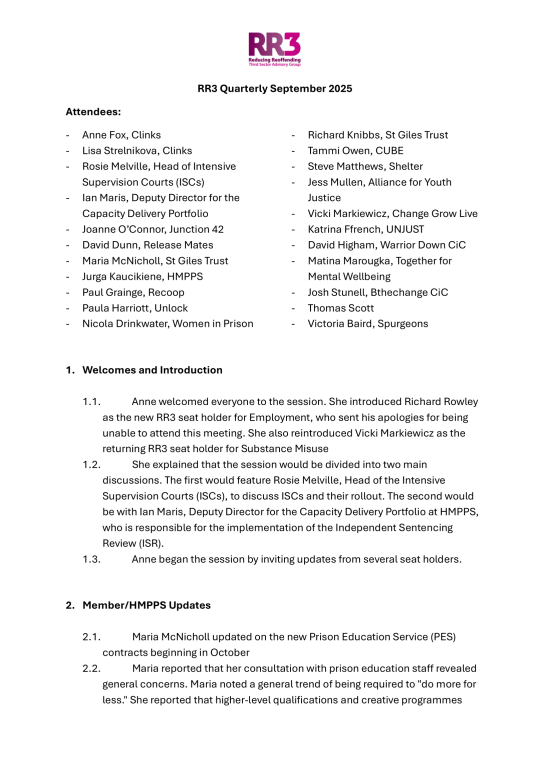So the much awaited MoJ response to the 'Transforming Rehabilitation' consultation has been announced, firstly in the Queens Speech on Wednesday and then with Mr Grayling taking to the airways Thursday morning. This is a culmination of many years of attempts to reform either prisons or probation services (or both) and undoubtedly today’s proposals are more significant, with a tighter implementation process, than any we have seen before. If successful they will change the delivery of rehabilitation services for many years to come.
For those who have been watching this space since the first intentions were announced with the arrival of Mr Grayling as Minister for Justice, today’s announcements contain much of what was expected with a few significant differences.
Firstly, the number of contract bundles (bundle size will determine the value of each contact) have been increased to 21. This is a real success for those who campaigned around this point. The original argument that we needed 16 bundles in order to have a viable sample size for payments by results has clearly shifted and the outcome is a welcome one, namely smaller contracts (the smallest is Norfolk and Suffolk with 5000 offenders). One consequence of this could be that a Voluntary and Community Sector organisation, or a mutual, is able to take on the lead provider role but this is not guaranteed. An organisation has to bid, and be successful before that happens, but it at least make a VCS challenge to the potential private sector domination of this market more realistic. Many might see this as a step too far for the Sector anyway, but there will undoubtedly be others that welcome it.
Secondly, the language has become tighter. The much embraced, but vaguer, concept of mentoring has been replaced by a stronger concept of supervision and putting “supervision” ahead of “mentoring” might end up being a significant, and complicated, change for the Sector. There has been some argument that the Sector was good at mentoring because probation could undertake the supervision function. These proposals could confuse that boundary and so undermine the relationship; although many VCS providers will work hard to ensure this does not happen. But the desire to have those with direct experience of the system more directly involved, the potential to build more individualised packages of support (rather than signing people up for programmes) remain and are things the Sector is likely to embrace.
Very disappointing is the lack of any specific proposals about women offenders and there remains a real danger that the progress that has been made via women’s centres over the past years will be set back despite the strong commitment to them by Helen Grant, the Minister with responsibility for women offenders. Also, given the number of people from the Black, Asian and minority ethnic community in the Criminal Justice System lack of any reference to this group in the proposals is very surprising and will be seen as a very important missed opportunity to do something about this much ignored issue.
But the real challenges are yet to come. This week's announcements are high level proposals and they do not contain the details that we need to see before we can be sure that this is a real opportunity for the Sector. There is no new money; tens of thousands are offenders are to be included in supervision arrangements and it is not entirely clear how much savings will be generated by these new arrangements and at what point. The Sector will really need to be on our guard to ensure a fair price for a decent service, and in the interests of society we need to ensure that the reduced resources end up where they should be – in service delivery and not in creating a new and expensive bureaucracy.
You can read our press release on this here
What's new
Blogs
Violence Against Women and Girls (VAWG) Strategy Blog
Publications
Latest on X
The role is for a leader from an organisation focused on racially minoritised people, with expertise in service delivery, policy, advocacy, or related areas in criminal justice. Racial disparities are present at every CJS stage. This role ensures these voices are central in shaping policy to help address and eradicate them. Apply by Mon 18 Nov, 10am. More info: https://www.clinks.org/voluntary-community-sector/vacancies/15566 #CriminalJustice #RR3 #RacialEquity

